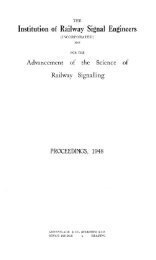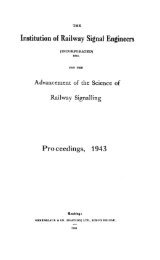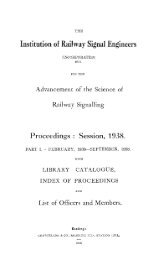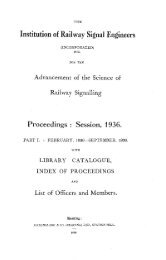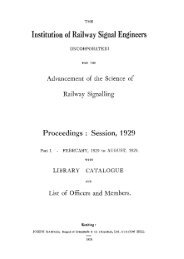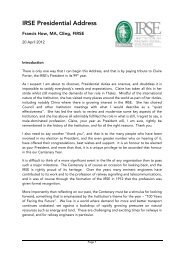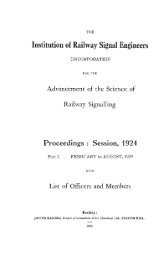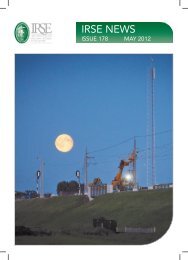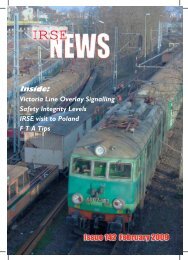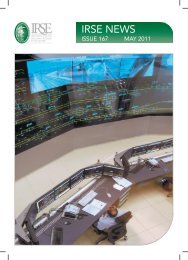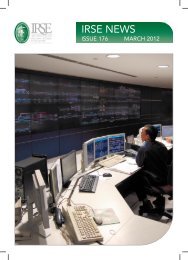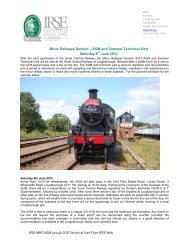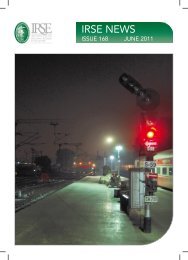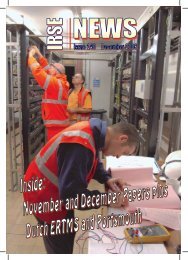IRSE Sept 08.indd
IRSE Sept 08.indd
IRSE Sept 08.indd
Create successful ePaper yourself
Turn your PDF publications into a flip-book with our unique Google optimized e-Paper software.
SECTION NEWS<br />
<strong>IRSE</strong><br />
A Report from Deep in<br />
the Heart of Texas<br />
by Wim Coenraad & Joe Noffsinger<br />
On May 20 2008, coinciding with the Rail<br />
Systems Suppliers Inc (RSSI) 1 2008<br />
Exhibition in Grapevine, Texas, the <strong>IRSE</strong><br />
North American Section (NAS) organised<br />
its first seminar. The subject of the<br />
seminar, “Lessons Learned in Safety<br />
Approvals” was chosen to introduce a new<br />
set of US Federal Railroad Administration<br />
(FRA) practices on this subject. The <strong>IRSE</strong><br />
President and immediate past president as<br />
well as the Chief Executive attended the<br />
seminar and had the pleasure of spending<br />
a few days in the company of the local<br />
committee and <strong>IRSE</strong> members.<br />
Amongst the speakers were <strong>IRSE</strong><br />
President Alan Fisher, giving a version of<br />
his presidential address to the NAS as well<br />
as immediate past President Wim<br />
Coenraad, invited to speak on European<br />
acceptance practices. It also allowed Wim<br />
to compensate for the fact he had not<br />
been able to visit the NAS earlier during his<br />
own presidential year.<br />
In Grapevine's Gaylord Texan Resort<br />
and Convention Center, a bit of a “Disney<br />
world “ style rendition of the old Texas,<br />
<strong>IRSE</strong> members and RSSI attendants<br />
gathered and listened to speakers<br />
representing an industry cross section,<br />
including: the FRA, Amtrak, Movares, New<br />
Jersey Transit, and Systra Consulting.<br />
It was interesting to note that the<br />
regulator FRA has tried to avoid being<br />
prescriptive in narrowly enforcing any<br />
single set of standards, such as the EN's<br />
we use in Europe. They have the view that<br />
“The System/Product Is At Least As Safe<br />
As What Was There Before” and “The<br />
Railroad and Vendors Specify How They<br />
Meet the Objective”. The FRA does not<br />
mandate a solution, nor does it perform<br />
certification or mandate any techniques or<br />
standards, but instead it intends to<br />
approve the documentation submitted by<br />
the Railroads, evaluate the adequacy of<br />
the analysis and monitor compliance of the<br />
stated safety argument.<br />
As the FRA can only regulate the<br />
Railroads, i.e. the infrastructure &<br />
Setting up for the first NAS Technical Forum<br />
Left to Right: Wim Coenraad (Movares),<br />
Mark Hartong (FRA), Kendrick Bisset (<strong>IRSE</strong> NAS)<br />
(picture Joe Noffsinger).<br />
operators (in North America they are<br />
generally the same entity), the burden of<br />
delivering the acceptance files is on the<br />
railway, and they will have to work out<br />
development of the comprehensive<br />
documentation with their suppliers. Whilst<br />
this may go some way towards alleviating<br />
the fears of being strangled in “European<br />
style CENELEC red tape”, there is the<br />
possibility that this lack of guidance might<br />
very well lead to scope creep, and ever<br />
increasing expectations on the side of the<br />
regulator. It is quite possible that each<br />
new set of safety case documentation will<br />
set a standard or a level of expectation for<br />
the next ones. If nothing else, EN 50129<br />
does at least give a framework of what a<br />
safety case is (and therefore also what it<br />
does not have to be). The fact that some<br />
us do not know how to interpret that<br />
cleverly, but would rather follow it to the<br />
letter instead of following the “good is<br />
good enough” criterion, cannot be blamed<br />
on the standard. Also, it will be interesting<br />
to see how North American suppliers will<br />
deal with prior acceptance for platforms<br />
and re-use/cross-acceptance of product<br />
safety cases in the absence of some sort<br />
of common reference. The rules<br />
specifically endorse CENELEC norms as<br />
one of the acceptable choices when the<br />
railway designates the standard to be<br />
applied for a new system. AREMA, IEEE,<br />
are also included on the list, but any other<br />
standard can be used where the railway<br />
can prove its applicability and<br />
appropriateness to FRA.<br />
The recent safety approval requirement<br />
is now codified in the US Code of Federal<br />
Regulations 2 , and is the result of a six-year<br />
process of “negotiated rulemaking” that<br />
included stakeholders of the regulator,<br />
railways, union labour representatives, and<br />
suppliers. While not mandating a<br />
particular technical standard, the rule is<br />
very specific on the process steps to<br />
approval, and the required contents of a<br />
filing for approval of a new system. The<br />
overarching burden is to demonstrate that<br />
the safety of operation on a line will not be<br />
adversely impacted by a new product or<br />
system. There is a catch, though. The<br />
analysis must include anticipated future<br />
operations, including such things as train<br />
density, increased passenger operations or<br />
hazardous material cargo, and any other<br />
operational changes. To date FRA has<br />
taken a pragmatic approach, and is<br />
coaching applicants through the process<br />
as both parties learn how to apply the<br />
requirement.<br />
Amongst other business, such as the<br />
NAS AGM and election of committee<br />
members, also concluded during the<br />
afternoon, the NAS was able to launch its<br />
new textbook “Introduction to North<br />
American Railway Signaling”, which is a<br />
worthy addition to the <strong>IRSE</strong>’s line of<br />
textbooks.<br />
Footnotes<br />
1 Railway Systems Suppliers<br />
Incorporated (RSSI) is a trade organisation<br />
for North American railway signal and<br />
communications suppliers. The primary<br />
mission is producing the annual exhibition,<br />
focused exclusively on S&C products and<br />
services. The 2008 Exhibition represented<br />
143 exhibiting companies with a<br />
registered attendance of 1323.<br />
http://www.rssi.org<br />
2 The new rule is in Volume 49, Part<br />
236, subpart “h” of the Code of Federal<br />
Regulations and is available with a<br />
detailed background explanation to those<br />
interested at<br />
http://edocket.access.gpo.gov/2005/<br />
pdf/05-3955.pdf<br />
<strong>IRSE</strong><br />
NEWS Issue 137 <strong>Sept</strong>ember 2008 31



